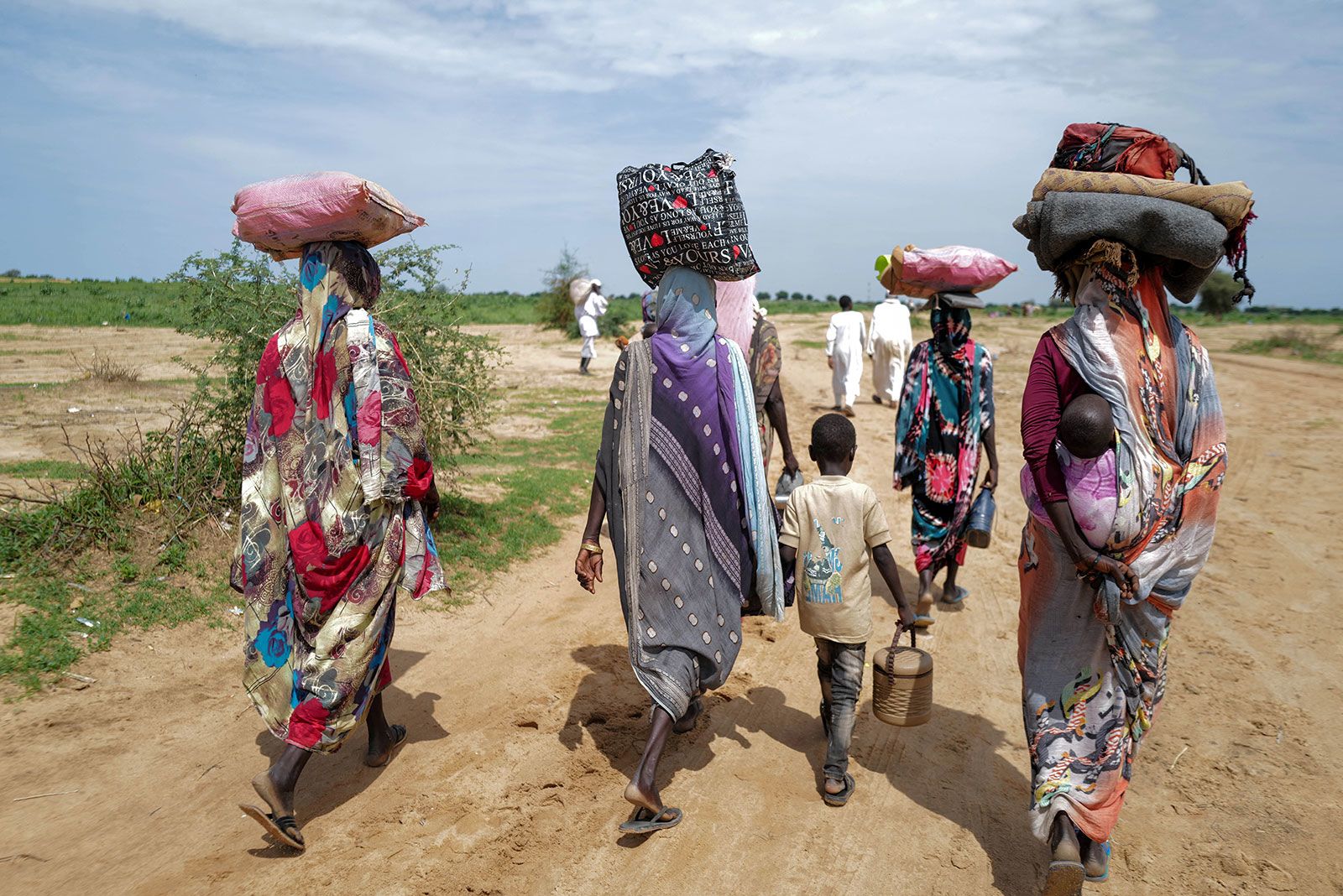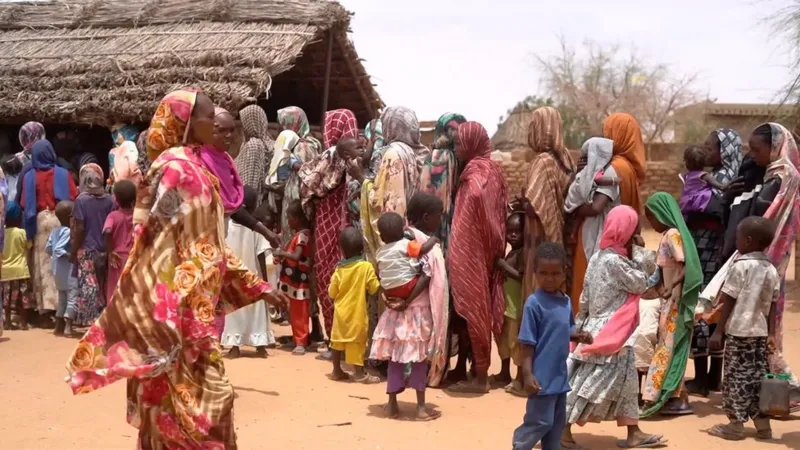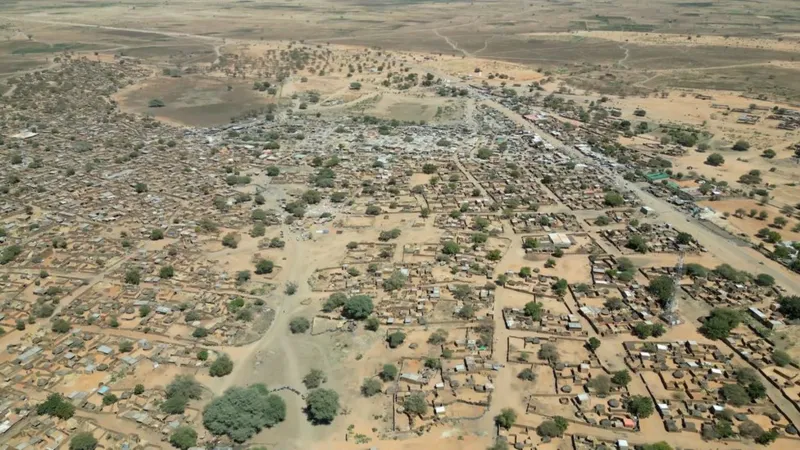Sudan Civil War! The children living between starvation and death
 A woman with a somber gaze and soft-spoken demeanor is just one among the millions residing in camps established for those displaced from their homes in Sudan. The nation is grappling with a civil war that erupted a year ago between the military and an armed paramilitary faction. Sudan is currently confronting what the UN has deemed the "most severe hunger crisis" in the world.
A woman with a somber gaze and soft-spoken demeanor is just one among the millions residing in camps established for those displaced from their homes in Sudan. The nation is grappling with a civil war that erupted a year ago between the military and an armed paramilitary faction. Sudan is currently confronting what the UN has deemed the "most severe hunger crisis" in the world.
Qisma Abdirahman Ali Abubaker mechanically waits in line to collect her food ration, but her heart isn't fully engaged in the process. The amount of food in the small bag is no longer as crucial for her family's survival as it once was.
Tragically, three of her children have succumbed to disease and malnutrition over the past four months. The eldest was three years old, followed by a two-year-old, and finally, a six-month-old baby. Seeking refuge, Ms. Abubaker now resides at Zamzam Camp for displaced individuals in Northern Darfur, a region in the western part of Sudan, which is currently grappling with dire warnings of a catastrophic nutrition crisis.
As Sudan's war enters its second year, Zamzam Camp, the oldest and largest of its kind in the country, is experiencing heightened desperation and sorrow. Médecins Sans Frontières (MSF) reports that in January alone, at least one child perishes every two hours within the camp. The scarcity of food, clean water, and healthcare means that illnesses that were once treatable now prove fatal.
MSF remains one of the few international humanitarian organizations still operating in Darfur. Recently, it conducted a comprehensive screening of vulnerable women and children at Zamzam Camp and shared the findings exclusively with the BBC. The results revealed a dire situation, with three out of every ten children under the age of five suffering from acute malnutrition, along with a third of pregnant and breastfeeding mothers. These findings confirm earlier concerns of an impending "catastrophe" as indicated by a previous survey.
Abdalla Hussein, MSF operations manager for Sudan, emphasizes that the current situation, with three out of every ten children under five suffering from acute malnutrition in Zamzam Camp, surpasses the threshold for a nutrition emergency. He suggests that this is likely just a glimpse of Sudan's broader hunger crisis.
Speaking from the MSF regional headquarters in Nairobi, Kenya, Hussein expressed concern that not all children in Darfur, let alone North Darfur, have been reached. He emphasizes that the statistics are based solely on one camp, highlighting the severity of the crisis across the region.
Humanitarian Crisis Unfolds in Darfur
 Accessing Darfur poses significant challenges for foreign journalists and aid organizations, but collaboration with a local cameraman allowed for the sharing of Qisma Abdirahman Ali Abubaker's harrowing story.
Accessing Darfur poses significant challenges for foreign journalists and aid organizations, but collaboration with a local cameraman allowed for the sharing of Qisma Abdirahman Ali Abubaker's harrowing story.
Unable to afford medical care or medication, Abubaker recounts the tragic deaths of her children, with one passing away on the way home from the pharmacy, another succumbing to malnutrition after six days, and the third falling ill and dying three days later.
Like many in Darfur, Abubaker's family relies on small-scale farming, but the violence and insecurity of the ongoing war have severely disrupted agricultural activities. She describes a dire situation where sickness and hunger afflict the population, with the majority of displaced individuals unable to find work and only government employees having access to money.
Zamzam Camp, already fragile due to ethnic violence two decades ago, now finds itself almost entirely dependent on humanitarian aid. However, food supplies halted as the conflict escalated, and most aid agencies evacuated when the paramilitary Rapid Support Forces (RSF) gained control over large parts of the region.
Allegations of looting by RSF fighters further exacerbate the crisis, despite denials from the paramilitary group. The transfer of new supplies across conflict lines proves extremely challenging, with Sudanese military authorities slow to issue visas and internal travel permits.
Additionally, the army's blockade of land routes from neighboring Chad has hindered the delivery of essential goods, although recent efforts by the World Food Programme have seen some progress in bringing in food convoys. Nevertheless, the influx remains insufficient to address the pressing need, compounded by a breakdown in health services across the country, where only a fraction of health facilities remain operational.
Child Healthcare Crisis in Darfur
 The Babiker Nahar Paediatric hospital in Fasher, near Zamzam Camp, serves as a critical facility with a therapeutic feeding center for children and intensive care treatment for severe cases. However, during a visit by our cameraman, both wards were already at full capacity.
The Babiker Nahar Paediatric hospital in Fasher, near Zamzam Camp, serves as a critical facility with a therapeutic feeding center for children and intensive care treatment for severe cases. However, during a visit by our cameraman, both wards were already at full capacity.
Babies with tubes in their noses could be heard whimpering softly in their mothers' arms, while Amin Ahmed Ali administered serum to her tiny son through a syringe, as her six-month-old twins slowly recovered from weeks of dysentery. Dr. Ezzedine Ibrahim, a medical professional at the hospital, expressed concern that while cases of malnutrition were present before the war, they have now doubled in number. Despite efforts to maintain a nutritional program in Northern Darfur, the conflict has caused it to lapse, exacerbating the crisis.
Child healthcare in Darfur faces immense challenges, with some areas being even more isolated and desperate. Images sent by a regional emergency worker depict the dire situation in these regions, described as a "black hole" in humanitarian assistance. One photo shows a three-year-old emaciated girl from Kalma IDP Camp in Southern Darfur, named Ihsan Adam Abdullah, who reportedly passed away last month. Another photo features a similarly malnourished boy from Genubia Camp in Central Darfur, whose mother, Fatima Mohamed Othman, pleaded in a video for assistance to feed her ten children, even if it's just "something small," as they are "living between starvation and death."
In response to the escalating crisis, MSF is set to open a 50-bed tent hospital in Zamzam and calls for other international aid agencies to return to alleviate the heavy humanitarian burden. Abdalla Hussein emphasizes the urgent need for a massive mobilization of humanitarian aid, simplified access with permits and visas, and the opening of borders. Without these fundamental conditions, it will be impossible to address the colossal crisis, leading to further tragic losses of children's lives.







































